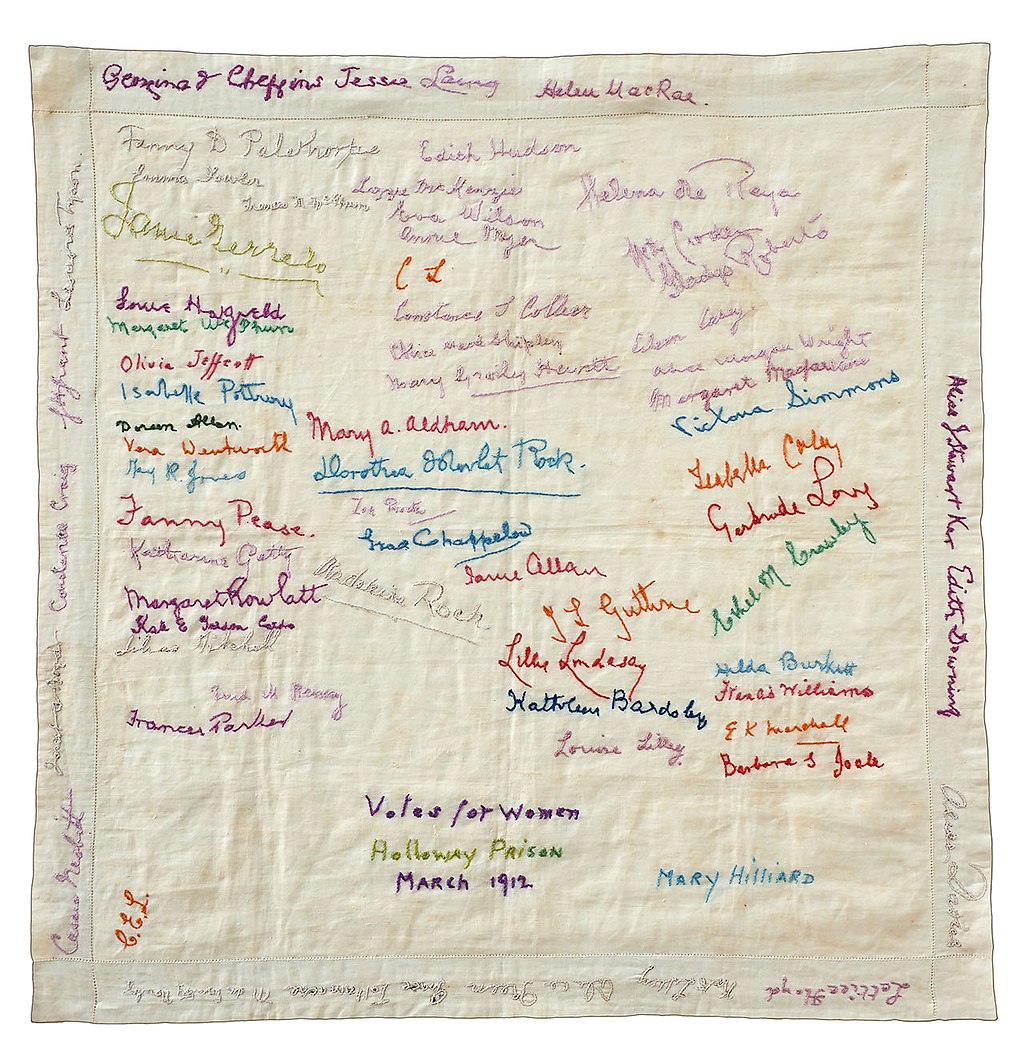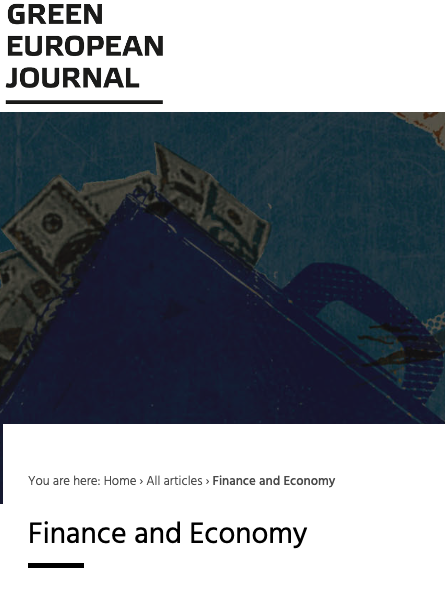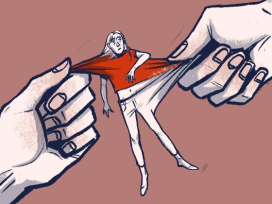Eurozine collaborator The Green European Journal interviewed Edith Kuiper about her book A Herstory of Economics, which reads economic thought from the perspective of latterly sidelined female economic thinkers.
Green European Journal: Your book focuses on female economic thinkers and writers who have been marginalized for many centuries in the profession. Can you tell us about the drivers of this injustice?
Edith Kuiper: The work that has been done on women in economics so far has mainly focused on the twentieth century, the time when economics became professionalized as a science. The emergence of women in economics took place at the end of the nineteenth century, but in my book, I go back further to the eighteenth century, because I am interested in the very origins of political economy. I looked at women economic writers who were not even members of academic economics or political economy.
In today’s context, it is difficult for people to realize how hierarchical and patriarchal Western society was – particularly in England. Women were very much under the control of men. The legislative system was set up in a way that made women invisible. They were practically the property of their husband when they got married – they lost their rights to property, their children, and their inheritance. The husband would make all legal decisions for them.
And even prior to being married, the disenfranchisement started: women did not have access to education – except for some very upper-class, aristocratic women who were allowed to join their brothers when the tutor came to their house. This situation had very radical implications: when a person fails to get any education, she won’t be able to read or write, know her rights, defend herself legally, and won’t be included in intellectual social conversations, let alone be able to get a decent job. And of course, it’s very difficult for someone in this position to organize.
Green European Journal: What impact did having access to education through their brothers’ tutors have?
Edith Kuiper: In the eighteenth century, some of those women who managed to obtain an education went on to establish schools for other women. They wrote about the importance of education. Sarah Trimmer (a well-known writer of eighteenth-century British children’s literature) is one of the important women who wrote an extensive book on how to start a school. And the book is, of course, addressed to the ladies. The same is true for women’s economic works more generally; many of them were addressed to other women.
Green European Journal: Why to other women, why not to society as a whole?
Edith Kuiper: At the time, gender fundamentally structured everybody’s lives. During the eighteenth century, men were in control of public and economic spheres while women were increasingly locked up in the private sphere, uneducated and unable to earn a living for themselves or build a career.
In this context, economic thinking develops without women being anywhere close. Political economy develops in clubs of men to which women didn’t have access. And not only did women not have access but also the economic topics that concerned women and their interests were not investigated or discussed – they were practically only laughed about.
Women were excluded from the theories developed by Adam Smith, David Ricardo and Thomas Robert Malthus that laid the foundation of economic thought and were virtually uncontested at the end of the nineteenth century. Later, the marginalist revolution turned out to be similarly exclusive. This new strand of economic thinking introduced a more technical approach that takes capitalism as a given. And women were excluded because the theories started from the self-interested and rational male economic agent – something that was claimed to be neutral and generic.
Some thinkers claimed that their theories applied to women’s experiences – which of course was not true, but there were no women in the room to tell them that. In fact, women’s issues were seen as deviant, belonging in the household, which was considered outside the economic realm. The household as such had already been excluded from Political Economy by Adam Smith. So, you can see that there was not only a physical exclusion of women from the places where economics was developed but also an exclusion of their experiences, agency and interests in the theories of the field.
Green European Journal: Was it not obvious for these theorists that an economic theory built around the ideal of the rational, probably white and wealthy, male, could not have a general application?
Edith Kuiper: The idea was, of course, that these thinkers were describing men who were active in the public realm – businessmen mainly. Later, they also focused on workers. This was an academic environment of white middle and upper-class men. They were living in the West, they were white guys, and they were in control of society, therefore, they considered it normal that their interests were the most important in the world; being on the privileged side, they did not have a reason to question that. This tradition continues until today.
Of course, these thinkers could have questioned this idea of the white male being representative of all humanity. But this was not a question that they thought could drive their field further. It would even be disruptive to their personal careers. So, they would not talk about it, nor think about it.
Green European Journal: Still, you mentioned that there were some women at the time who managed to become educated and started thinking, among other things, about economics. Who were they?
Edith Kuiper: That is another interesting aspect: women were not just excluded from academia and the focus of economics, they were also erased from the history of economics. There were women who were acknowledged for their contribution during their lifetime, but their names are barely mentioned in the literature. There was, for example, Émilie du Châtelet. She has recently been rediscovered – and is now famous – but until 10 years ago, we only knew her as a weird lady lover of Voltaire. In truth, it appears that she was an active contributor to the French Enlightenment. She had her own community in which mathematicians, philosophers and other intellectuals, even somebody like Voltaire, would come by to write and discuss relevant issues. She translated the works of Mandeville and Newton into French, adding her own thoughts in introductions and commentaries. But then, the history of economic thought has been written, and the historians being men, considered her contribution uninteresting.
Another important name is Sophie de Grouchy de Condorcet, who translated Adam Smith’s Theory of Moral Sentiments into French and added a set of eight letters with her own comments to the 1798 edition. These letters were only translated into English in 2008. As a member of the aristocracy, she was very well connected, ran a salon and was popular amongst the people that mattered. Still, historians of economics almost exclusively mention her husband and consider her work irrelevant. In fact, a lot of the work of female authors addressed themes that weren’t acknowledged in economic theory – like marriage as an economic institution, education, or consumer behaviour. That is another reason why the work of these women was seen as uninteresting by historians of economics.
While more women in the twenty-first century go into economics, they remain marginalized. They don’t decide the direction of the economic discipline because they are a minority at the level of full professors. In the United States, only about 15% of economics professors were women in 2021. So, that is still not a critical mass (which is 25% or higher). Women are still the exception and that is not good for economic science.
Green European Journal: What was your personal experience when you entered the field of economics?
Edith Kuiper: I first wanted to study physics because it was difficult, but then I developed an interest in economics. I tend to do things that I find interesting without always fully recognizing how difficult they are. In our societies, economics functions like a religion; it guides our decisions on who gets what and why. So, I wanted to understand economic reasoning. I was especially motivated to understand why economics is more interested in using people to produce wealth than producing wealth to make people happy.
And I realized in the first week of my studies that the mainstream approach to economics is very limited, and that makes it dangerous. If you tell people again and again that they are self-interested, they will inevitably become self-interested. At that time, neoclassical economics dominated academia, Marxism was silenced, and other approaches were marginalized and vilified – at least until the mid-1990s. There was hardly any space to develop an alternative economic perspective. That meant that a paper that applied alternative approaches wouldn’t be really recognized by others in the field. I remember that even Amartya Sen’s Nobel Prize was laughed about in my department. At the time, neoclassical economics had been dominant not only in academia but also in policymaking at the World Bank and the IMF, among others. The same theories were taught all over the world and critical scholars had raised similar concerns.
Still, as a group of women, we decided to start studying the economics of women. But there were hardly any books on the issues that interested us. That was tough and exciting at the same time. At some point, I found a colleague Jolande Sap who had a similar view of the issues of gender, feminism and economics as I did. We organized an international conference. I went to the United States, where academics were a bit further with all this, and the Americans came to Amsterdam to facilitate an exchange of ideas. So, we were able to connect worldwide with other people who saw that gender had been a structuring factor in the development of political economy and economic science. That was just fantastic. There were people from New Zealand, Brazil and Russia, for example.
We were with approximately 120 people at the conference, from different parts of the world, and we all understood each other. That was a clear sign of how important our approach to gender and economics was.
Green European Journal: So far, only two female economists have received the Nobel Prize: Elinor Ostrom and Esther Duflo. Why is that? Even if only 15% of professors are female, there should be enough material out there to choose more female economists. So, is there also a problem inside the Nobel Prize in Economics Committee?
Edith Kuiper: Yes, the problem is part of the culture in economics. We need to ask ourselves a few questions: Who is being selected for the Committee? What are their values? I know people who would be great candidates for the Nobel Prize, but it takes a long time and connections to get nominated. Feminist economists hardly have the kind of time and connections to do that. It took years to get Amartya Sen nominated, even though he is totally brilliant and made a significant impact on development economics. The Committee members were not happy about giving him the prize because he is left-leaning and a self-proclaimed feminist economist. But they could not find a compelling reason to refuse him.
Overall, we can see that the Nobel Prize reflects the current situation in the field of economics. I do not expect the Nobel Committee to award an African-American woman in the next 20 years, for instance. When Ostrom got the prize, Gary Becker complained that economics is turning into social or cultural science. So, this sexist attitude is really sticky.
One of the ways to protect the position of economics as a science has been the increased use of mathematics in its theories. But I believe that this emphasis on mathematics would not be a necessity. The thing is that while physics has a very concrete subject to study, ‘the economy’ is a social and political construct. So, what is defined as the economy is not obvious. And male economists have, over the years, defined the economy as an activity that women do not partake in. From the very beginning of political economy, patriarchy crept in. In fact, economics is very much linked to power. It provides an ideology that rationalizes economic relations. Those who are powerful in economics are also powerful in society, so economists have a huge voice. When, for instance, 200 economists say that the minimum wage should go up, that will become an impactful news item.
Green European Journal: What would be the takeaway of your book for activists or progressive political parties?
Edith Kuiper: While writing the book, I learned how strong the impact of patriarchy has been on economic thinking. I knew before that it was strong, but I didn’t know it was practically fundamental. Still, I think the book is good for the heart, in the sense that a lot of these people you can read about did so much more than what you would expect based on the dominant narratives. Their work grounds economic thinking and brings it back to our lived experience and everyday problems.
Although they were written out of history books, they were still successful. Quite a few women were awfully famous when they were alive. Everybody knew them. And yet they did not end up in the history books.
In this sense, the book can inspire individuals, economists and politicians with new ideas on how to think about the economy, as well as how to make it fairer. And it also helps readers recognize that today’s mainstream economics is just one story about the way the economy works. It might be the dominant story, but it is still a limited one. I call mainstream economic theory ‘status quo economics’ because it can’t deal, for example, with substantial changes in the economy, such as climate change. My book shows that if you integrate women, if you recognize women’s voices and the voices of women of colour in particular, you can learn something amazing. To understand what is going on in the economy, these voices must be heard and taken seriously.
Green European Journal: You mention that climate change cannot be addressed by status quo economics, but how could feminist economics help Greens to put it on the agenda?
Edith Kuiper: Historically, the feminist movement and the environmental movement had similar or parallel interests. Their issues were excluded from mainstream economic thought. For neoclassical economists, nature is a given and as such, it’s up for grabs. This is similar to how the work of women in the household is taken as a given and not valued or considered as a cost. This makes the problems of these two fields similar, to some extent.
In the past, feminist economists had been shy to take steps toward environmentalists, partly due to the essentialism that very quickly linked nature and women. Feminist economists like Bina Agarwal showed that this was not a productive approach. At the same time, the Green movement has often come up with a very similar analysis to that of feminist economists, but without recognizing this similarity. So, that means that to some extent we were inventing the wheel twice – just giving it different names.
But by now, I think, there is an increasing awareness amongst Greens and feminist economists that they must cooperate and understand better the interests their movements share. Recently, there has been a lot of productive work on reaching a common understanding of the problems, their root causes, as well as possible solutions. I think that environmentalists and feminist economists could mutually strengthen their voices.
This article was first published by Green European Journal on 13 September 2022.








